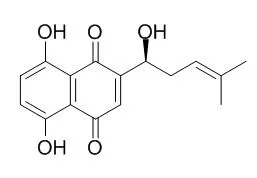| Description: |
Shikonin is a natural red naphthoquinone pigment, has antimicrobial, anti-tumor, and anti-inflammatory effects; a purified shikonin preparation is widely used for the production of medicinals, cosmetics, and some food products; shikonin also enters into the antiinflammatory ointment and cream compositions used for the treatment of burns. It can suppress the cell viability, adhesion, invasion and migratory ability of MGC-803 cells through TLR2- or NF-κB-mediated pathway. |
| Targets: |
PI3K | Akt | TLR | NF-kB | MMP(e.g.TIMP) | ROS | Bcl-2/Bax | Caspase | PARP | p53 | Antifection |
| In vitro: |
| J Pharm Pharmacol. 2015 Apr 16. | | Shikonin inhibits the cell viability, adhesion, invasion and migration of the human gastric cancer cell line MGC-803 via the Toll-like receptor 2/nuclear factor-kappa B pathway.[Pubmed: 25880237] | Shikonin is an active naphthoquinone pigment isolated from the root of Lithospermum erythrorhizon. This study was designed to explore the inhibition of Shikonin on cell viability, adhesion, migration and invasion ability of gastric cancer (GC) and its possible mechanism.
METHODS AND RESULTS:
3-(4,5-Dimethylthiazol-2-yl)-2,5-diphenyltetrazolium bromide assay was performed for cell viability and adhesion ability of MGC-803 cells. Cell scratch repair experiments were conducted for the determination of migration ability while transwell assay for cell invasion ability. Western blot analysis and real-time polymerase chain reaction assay were used for the detection of protein and mRNA expressions. Fifty per cent inhibitory concentration of Shikonin on MGC-803 cells was 1.854 μm. Shikonin (1 μm) inhibited significantly the adhesion, invasion and migratory ability of MGC-803 cells. Interestingly, Shikonin in the presence or absence of anti-Toll-like receptor 2 (TLR2) antibody (2 μg) and nuclear factor-kappa B (NF-κB) inhibitor MG-132 (10 μm) could decrease these ability of MGC-803 cells markedly, as well as the expression levels of matrix metalloproteinases (MMP)-2, MMP-7, TLR2 and p65 NF-κB. In addition, the co-incubation of Shikonin and anti-TLR2/MG-132 has a significant stronger activity than anti-TLR2 or MG-132 alone.
CONCLUSIONS:
The results indicated that Shikonin could suppress the cell viability, adhesion, invasion and migratory ability of MGC-803 cells through TLR2- or NF-κB-mediated pathway. Our findings provide novel information for the treatment of Shikonin on GC. | | Pharm.Chem. J., 2001, 35(8):435-6. | | Antimicrobial Activity of Shikonin Preparations.[Reference: WebLink] | Shikonin is a natural red naphthoquinone pigment synthesized in the roots of plants belonging to the Boraginaceae family.
METHODS AND RESULTS:
At present, a purified Shikonin preparation is widely used in Japan for the production of medicinals, cosmetics, and some food products [1]. In Russia, Shikonin enters into the antiinflammatory ointment and cream compositions used for the treatment of burns. Shikonin possesses a broad spectrum of antimicrobial activity.
CONCLUSIONS:
In this context, it was of interest to study the antimicrobial properties of commercial Shikonin and the related aqueous ethanol and oil extracts from the cell culture of Arnebia euchroma. |
|
| In vivo: |
| Cell Physiol Biochem . 2018;45(6):2461-2470. | | Alkannin Inhibited Hepatic Inflammation in Diabetic Db/Db Mice[Pubmed: 29554661] | | Abstract
Background/aims: The current study was designed to investigate the protective role of alkannin (ALK) on liver injury in diabetic C57BL/KsJ-db/db mice and explore its potential mechanisms.
Methods: An oral glucose tolerance test (OGTT) was performed. The levels of insulin, alanine aminotransferase (ALT), aspartate aminotransaminase (AST), total cholesterol (TC) and triglyceride (TG) were determined by commercial kits. The pro-inflammatory cytokines interleukin (IL)-1β, IL-6 and tumour necrosis factor (TNF)-α were determined by ELISA. The levels of the ROCK/NF-κB pathway were determined by Western blotting.
Results: The contents of pro-inflammatory cytokines interleukin (IL)-1β, IL-6 and tumour necrosis factor (TNF)-α were inhibited by ALK, metformin or fasudil in diabetic db/db mice. Further, Western blotting analysis showed that the expression of Rho, ROCK1, ROCK2, p-NF-κBp65, and p-IκBα was significantly reversed by ALK treatment. In human hepatic HepG2 cells, the hepatoprotective effects of ALK were further characterized. With response to palmitic acid-challenge, increased amounts of insulin, ALT, AST, TG, and TC were observed, whereas ALK pretreatment significantly inhibited their leakage in HepG2 cells without appreciable cytotoxic effects. The inflammation condition was recovered with ALK treatment as shown by changes of IL-1β, IL-6 and TNF-α. Further, Western blotting analysis also suggested that ALK improves hepatic inflammation in a Rho-kinase pathway.
Conclusion: The present study successfully investigated the role of Rho-kinase signalling in diabetic liver injury. ALK exhibited hepatoprotective effects in diabetic db/db mice, and it might act through improving hepatic inflammation through the Rho-kinase pathway.
Keywords: Alkannin; Inflammation; Liver injury; Rho-kinase pathway. |
|






 Cell. 2018 Jan 11;172(1-2):249-261.e12. doi: 10.1016/j.cell.2017.12.019.IF=36.216(2019)
Cell. 2018 Jan 11;172(1-2):249-261.e12. doi: 10.1016/j.cell.2017.12.019.IF=36.216(2019) Cell Metab. 2020 Mar 3;31(3):534-548.e5. doi: 10.1016/j.cmet.2020.01.002.IF=22.415(2019)
Cell Metab. 2020 Mar 3;31(3):534-548.e5. doi: 10.1016/j.cmet.2020.01.002.IF=22.415(2019) Mol Cell. 2017 Nov 16;68(4):673-685.e6. doi: 10.1016/j.molcel.2017.10.022.IF=14.548(2019)
Mol Cell. 2017 Nov 16;68(4):673-685.e6. doi: 10.1016/j.molcel.2017.10.022.IF=14.548(2019)